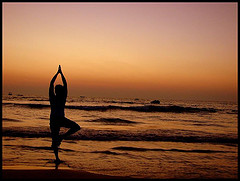 India has organized a team of researchers and scientists to identify and record all ancient yoga positions (or asanas [1]) in an attempt to prevent people living in other countries from patenting this existing knowledge.
India has organized a team of researchers and scientists to identify and record all ancient yoga positions (or asanas [1]) in an attempt to prevent people living in other countries from patenting this existing knowledge.
Some refer to this practice as yoga piracy [2], where people claim patents and/or copyrights on yoga postures and techniques found in ancient texts that originate in India. For example, according to an article [3] in The Telegraph, there have been more than 130 yoga-related patents, 150 copyrights and 2,300 trademarks in the United States alone.
In response, the Indian government has started scanning ancient texts and documenting yoga asanas. The information is being stored in the Traditional Knowledge Digital Library, an electronic encyclopedia of India's traditional medicine, which will be made available to patent offices globally. Amit Agarwal elaborates [4]:
“Alarmed by the growing number of instances of Western yoga gurus claiming copyrights to ancient ‘asanas,’ the Government of India has decided to fight back.
The Union Health Ministry has assembled a team of 200 researchers from the Council of Scientific and Industrial Research (CSIR) to put on record all known yoga postures and techniques in a comprehensive database called Traditional Knowledge Digital Library (TKDL).
The Government of India hopes that future patent applications would be rejected on the basis of ‘prior art’ [5] from the information in the TKDL.”
So far 600 asanas [6] have been added to the database, and the team plans to record at least 1,500 yoga postures by the end of this year. Many people are applauding this move. For example, Marathi vedic, commenting on a Times of India article, says [7]:
“I completely support this move… We have to preserve our culture which is being attacked by westerners by not only patents but also by missionary activities…Wake up Vedics!!!! This is our country!!!! Our culture if not us who will preserve it????”
Swami Param, commenting on a post on YogaDork, adds [8]:
“Many Hindus are just now beginning to realize that in their sharing of the Hindu/Yogas, they did not realize that those who took this gift would then, effectively, steal it. The entire phony yoga movement consists of a concerted effort to erase any Hindu connection to Yoga. Of course anyone with a bit cursory knowledge, realizes that all of real Yoga is Hinduism. It is past time to put an end to this theft, distortion and business of ‘yoga’.”
The idea of yoga as a business was brought to the forefront when Bikram Choudhury was granted a copyright and trademark and applied for a patent for a style of yoga he founded. Called Bikram yoga (or “hot yoga”), it involves a series of 26 poses that are performed in a steam room. Gopika Kaul, writing on Spot-On, elaborates [9] on Choudhury's motivation:
“The practice of yoga is first described in Hindu sacred texts dating back five thousand years and Hindu sages have been practicing the art for centuries…The gurus, rightly, see yoga as an Indian tradition that is being popularized and, to some extent corrupted, by the West. Why is Bikram so anxious to stake his legal claim? Yoga has changed its image. An element of Indian culture – a quasi-religious element – has become a multibillion-dollar industry.”
In the United States, the yoga business brings in $5.7 billion a year, according to Yoga Journal [10], including money spent on yoga classes and products. Some people question the idea of making money off yoga at all, though. guerrilla mama medicine says [11]:
“i have questioned often the cultural co-optation of making money from teaching yoga. the fact that we teach an art and science that we have access to because of our incredible economic and military privilege in the US.
where is the moral conscience of these yoga teachers? … how the hell are you going to call it ‘yoga’ and then claim that you thought of that unique way of bending over and teaching your toes? if you call it yoga (which is a sanskrit word)–you lost any right to a patent. the reason that someone in india isnt suing you for stealing their cultural knowledge ‘yoga’ is because it is collective knowledge. the best we are doing is borrowing that knowledge for a short amount of time. and then we give it back.”
However, yomamma, commenting on a post on Guruphiliac, points out [12] that it's not just people in the West profiting off of yoga.
“This whole deal of complaining about Westerners on the part of both Westerners and Easterners is kind of tiresome, so many Indians have come here because we will buy what they have, support their arts, spirituality, give jobs, etc… so i think the upside far outweighs the bad for the east and for the west…
… All the yoga teachers I know acknowledge their teachers and forbearers, they don't pretend to have invented anything, they are in some cases making a good living, but that is mostly do to hard work and devotion. Popularization was begun in the west, a lot of these arts might be dying otherwise or at least not getting the attention they are now. That being said I don't disagree with this movement to authenticate and protect, it's probably a good idea.”
Photo of Yoga By Sunset [13] by Mahesh Khanna [14] on Flickr.